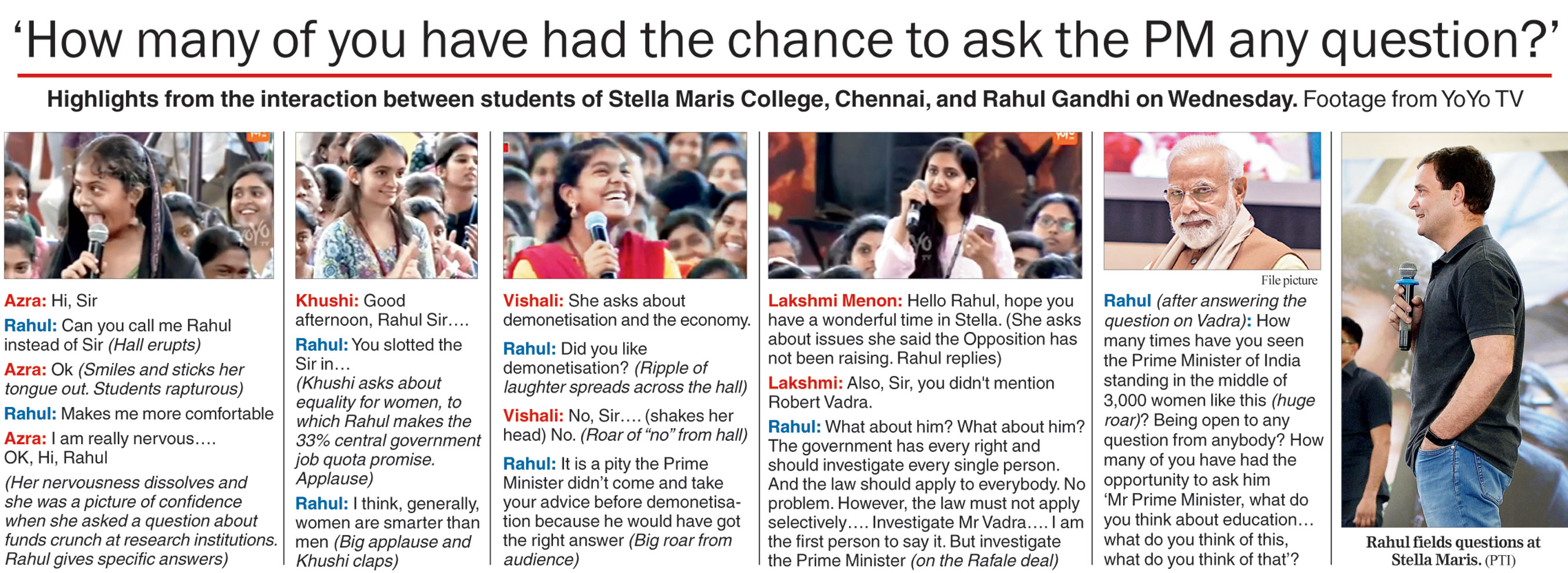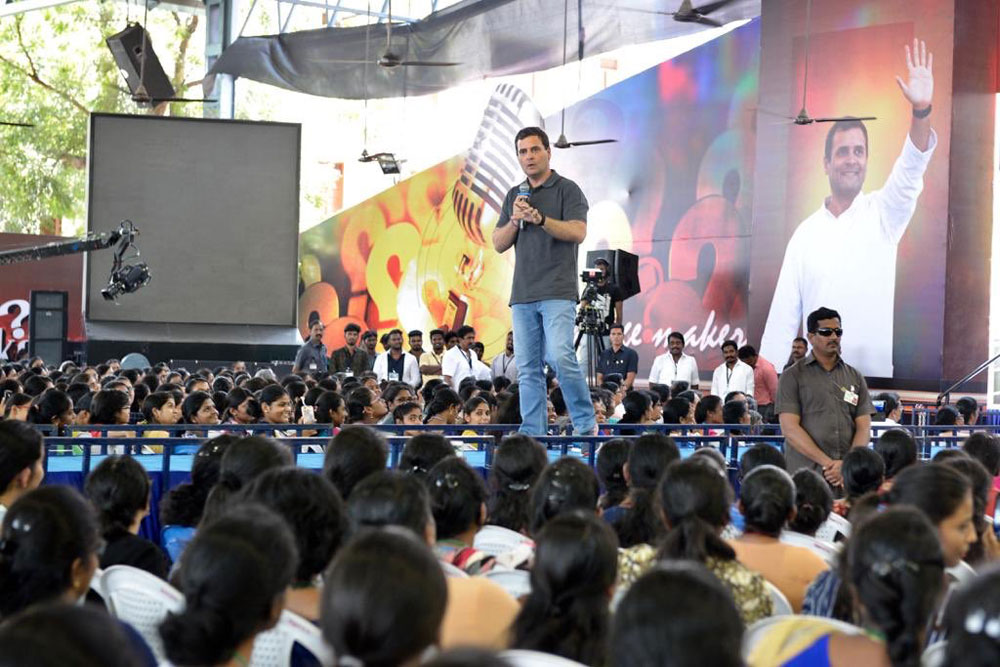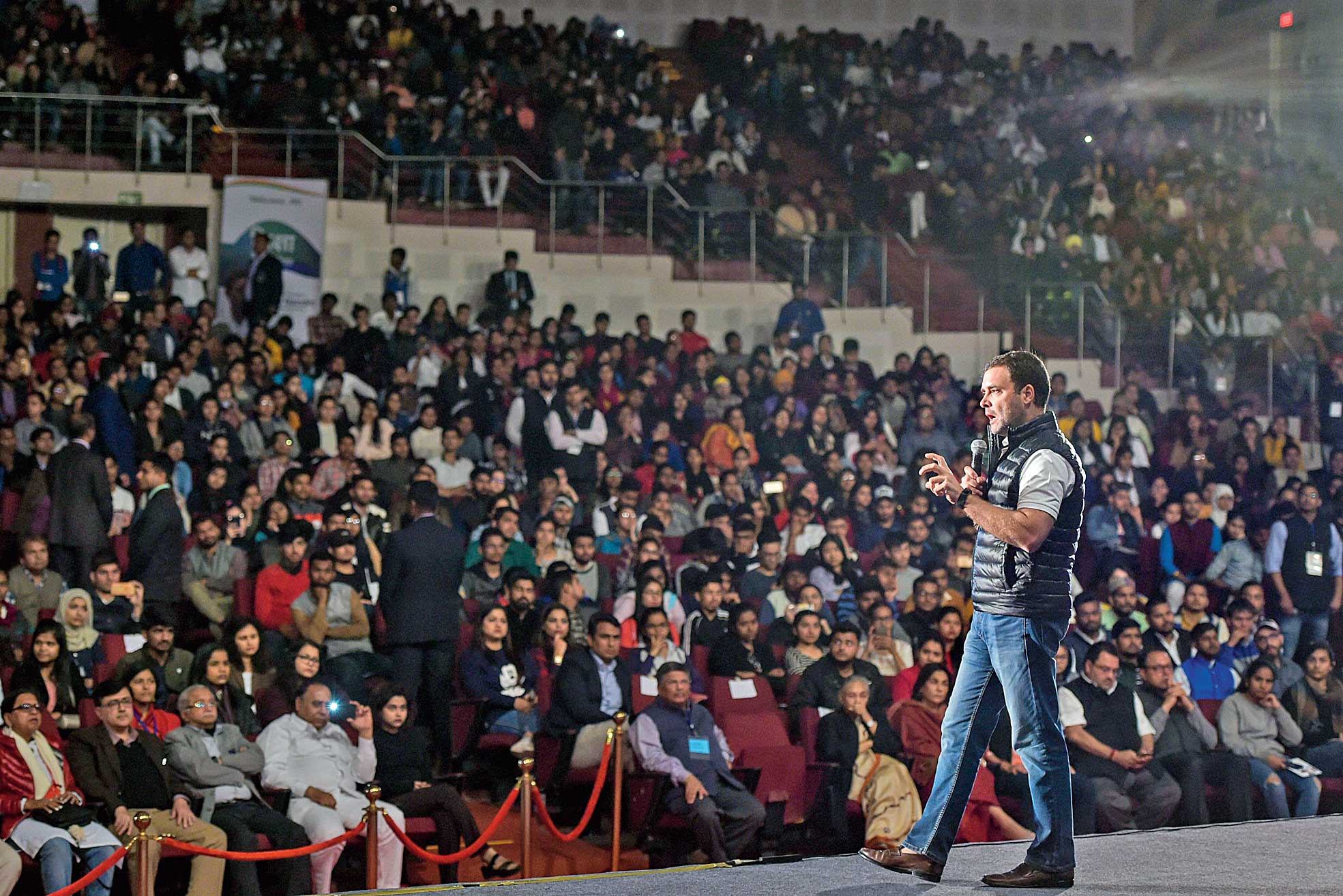Rahul Gandhi on Wednesday promised 33 per cent reservation for women in all government jobs if the Congress comes to power after the April-May Lok Sabha elections.
The dramatic intervention in the job quota discourse — which the party says wouldn’t disturb the existing 49.5 per cent caste-based reservation — came as the Congress president interacted with students of Stella Maris College in Chennai.
Rahul made two promises: passage of the much-awaited women’s reservation bill and the 33 per cent quota in government jobs.
“I don’t see enough women in leading positions.… The attitude towards women needs to change. Women should be pushed into leadership roles. I think, generally, women are smarter than men. That’s where I come from,” Rahul said.
He got a rapturous reception from the girls, some of whom sang: “Abki baar, Congress sarkar (The Congress will form the government).”
Party leaders in Delhi said the quota promise was part of the Congress’s manifesto and there was no constitutional bar on reserving jobs for women.
“If you read Articles 15 and 16 together with the Indira Sawhney judgment of the Supreme Court, all governments should work for the rights of women and children,” party communications chief Randeep Surjewala said. “Articles 15 and 16 talk against discrimination on grounds of religion, race, caste, sex and place of birth.”
The 1992 judgment by a nine-judge constitution bench was about affirmative action in favour of the Scheduled Castes, Scheduled Tribes and other weaker sections. The judgment did not specifically deal with women but Surjewala appears to have given an expanded interpretation of the ruling.
It was a Congress-led government in 1993 that had passed the 73rd amendment to the Constitution that provided for 33 per cent reservation for women in local units of self-government such as panchayats and civic bodies.
The Chennai announcement would be Rahul’s major poll plank apart from the minimum income guarantee plan he had declared earlier. Senior party leaders said there could be a few more attractive schemes in the manifesto.
The Congress on Wednesday presented a report card on the job crisis under the Narendra Modi government and said the party’s top agenda was employment generation.

Asked if issues like jobs would gain currency when the Prime Minister was so forcefully hyping up emotive issues, particularly related to Pakistan, Surjewala said: “No emotion can be more powerful than livelihood. People’s miseries and struggle because of unemployment is the most common emotion.”
The Congress leader added: “Modi can’t hide behind soldiers’ sacrifice after destroying jobs. He is the only Prime Minister who not only failed to create jobs but also destroyed jobs by demonetisation and a flawed GST. Go and find out the emotions of a youth who accepts the job of a security guard after doing an MBA or engineering. Ask an old man whose two-three sons and daughters are jobless. India has 52 per cent youths and the unemployment rate among them is between 13 per cent and 27 per cent.”
On the government’s record on the job front, Surjewala said: “Modi came with a promise of two crore jobs every year. At the end of his five-year term, unemployment is at a 45-year-high. Economic growth is at a five-year low. Farm income growth is at a 14-year low. Fresh investments are at a 14-year low. Private investments are at a seven-year low. Industrial growth is at a low of 1.7 per cent (down from 7.5 per cent a year ago). Household savings are at a 20-year low.”
Growth in FDI, he added, is at a five-year low. “Core sector growth is at a two-year low. Growth of exports (compared to when the UPA was in power) has fallen by 15 times (393 per cent to 26 per cent under Modi).
“The job crisis is such that the CMIE (Centre for Monitoring Indian Economy) survey put the unemployment rate at 7.2 per cent and the National Sample Survey Office (NSSO) put it at 6.1 per cent. Post-demonetisation, joblessness among rural males (aged between 15 years and 29 years) has risen from 5 per cent in 2011-12 to 17 per cent in 2017-18.
“Among rural females (aged between 15 years and 29 years), joblessness has risen from 4.8 per cent in 2011-12 to 13.6 per cent in 2017-18 (NSSO report, 2017-18),” Surjewala said.
“Similarly, in the post-demonetisation year, joblessness among urban males surged from 8.1 per cent in 2011-12 to 18.7 per cent in 2017-18.”
For urban women, he added, the figure rose from 13.1 per cent to 27.2 per cent in 2017-18.













